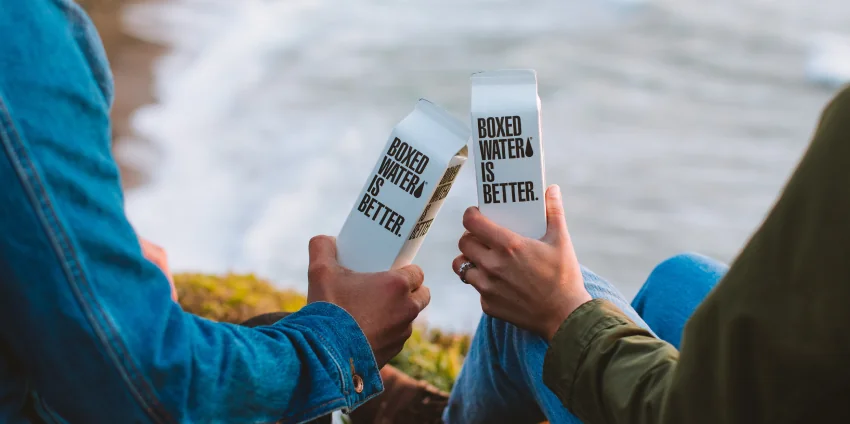- Embrace bio-based, circular production
- Cut out the middleman
- Use eco-friendly packaging materials
- Make packaging recyclable and compostable
- Reduce your return rate
- Use organic composting methods
- Design products to be low impact
- Rethink the ordinary
- Make your products reusable
- Find like-minded partners to help achieve your sustainability goals
- Get your products straight from the source
- Emphasize your eco-friendly products
- Design timeless items that don’t need to be replaced
- Give back to your community
- Create a sustainable loop
- Eliminate unnecessary packaging
- Reuse leftover supplies
- Only create what is being ordered
- Plant a tree for every purchase
- Use carbon neutral shipping methods
- Bring awareness to ecological issues
- Look at the details of your materials
- Resell old products
- Create a long-term delivery schedule
As online shopping continues to grow in popularity, so does packaging waste. Split shipments and “try before you buy” are two ordering trends that produce even more waste. The good news? A recent survey revealed that 85% of consumers have adjusted their purchasing habits over the past 5 years to be more eco-friendly. As consumer habits around sustainability adapt, brands that invest in sustainable commerce solutions will reap the long-term rewards.
Sustainable eCommerce practices, such as compostable packaging, help reduce a company’s ecological footprint. No matter what you sell or how big your business is, you can make a difference by making some small changes.
We talked to some highly successful business owners about the sustainable eCommerce moves that they’ve made. You’re bound to get some inspiration from these bright minds. Check it out below.
1. Embrace bio-based, circular production
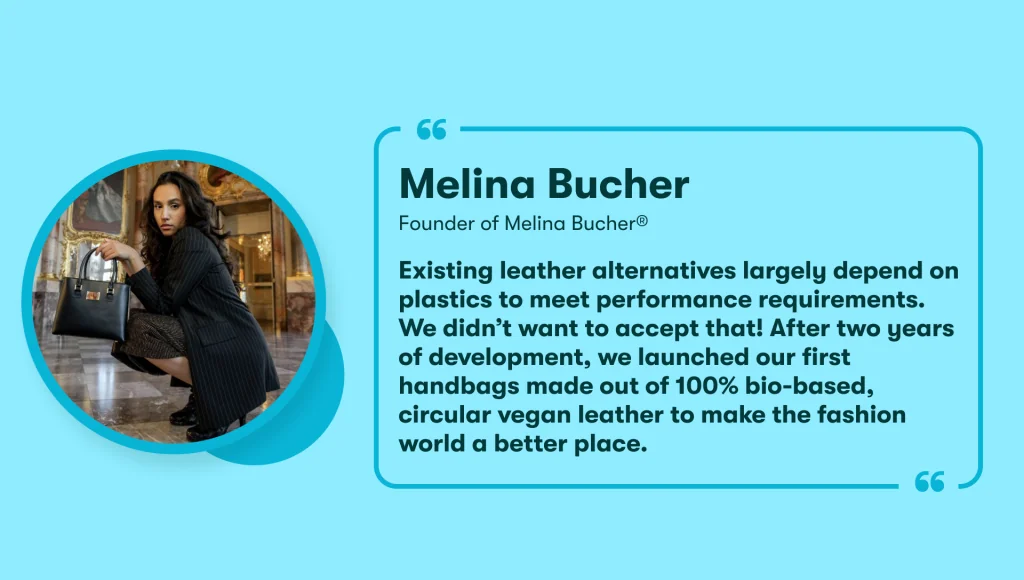
If you’re in the apparel industry, you’re likely already very aware of the fact that certain materials take a large toll on the environment. To help fight against that, Melina Bucher decided to rethink her company’s reliance on harmful fabrics like leather.
About her brand’s unique approach, she said, “Fashion has a huge environmental impact and leather is one of the most problematic fabrics – both ethically and environmentally. Existing leather alternatives largely depend on plastics to meet performance requirements. We didn’t want to accept that!”
She then developed an entirely new approach. “After two years of development, we launched our first handbags made out of 100% bio-based, circular vegan leather to make the fashion world a better place.”
2. Cut out the middleman
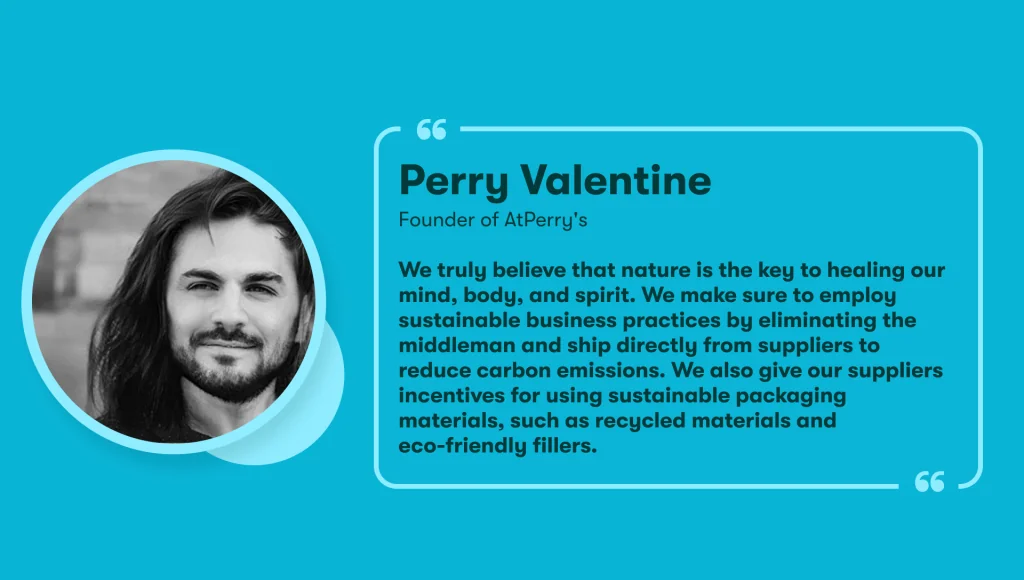
Shipping is one of the biggest parts of all eCommerce businesses’ supply chains. It’s also one of the biggest contributors to a company’s carbon footprint. A lot of emissions are created moving a product from a vendor to a warehouse and then finally to the customer. Perry Valentine, the founder of crystal shop AtPerry’s, targeted this to lower his environmental impact.
“Here at AtPerry’s, we truly believe that nature is the key to healing our mind, body, and spirit. With that said, we make sure to employ sustainable business practices by implementing eco-friendly shipping methods. For this, we eliminate the middleman and ship directly from suppliers to reduce carbon emissions, and also give our suppliers incentives for using sustainable packaging materials, such as recycled materials and eco-friendly fillers.”
Subscribe to the eCommerce newsletter for
top industry insights
3. Use eco-friendly packaging materials
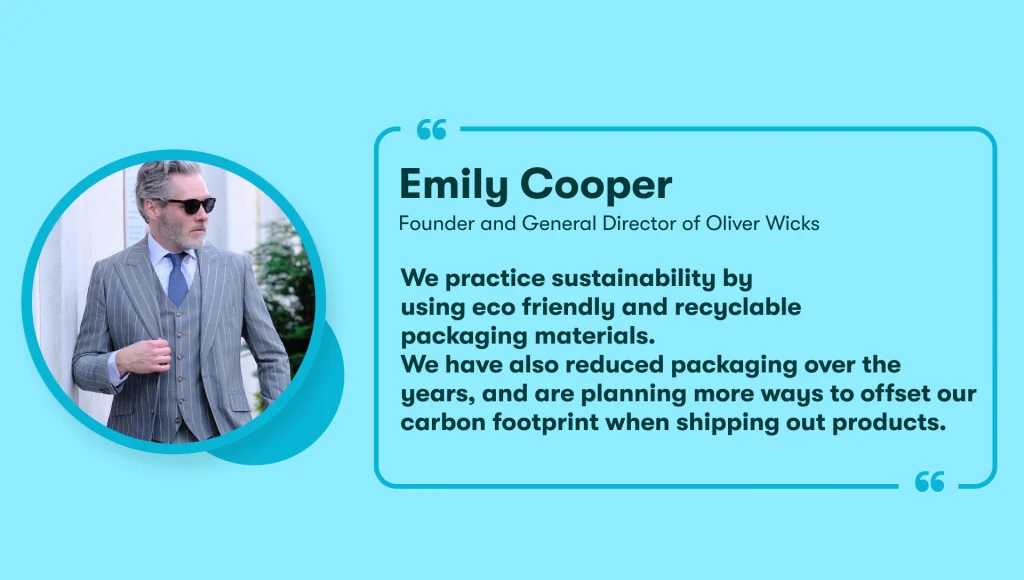
Getting product packaging right is tricky. Some customers expect lots of it while others want you to go as minimal as possible. But packaging also is usually one-use, and that means it’s not exactly great for the environment.
Oliver Wicks is a company that makes custom suits for men, so their clients expect everything to be as high quality as possible. But Emily Cooper, the store’s founder, explained how their approach to packaging shows off a different kind of high quality. “We practice sustainability by using eco-friendly and recyclable packaging materials,” she said. “We have also reduced packaging over the years, and are planning more ways to offset our carbon footprint when shipping out products.”
4. Make packaging recyclable and compostable
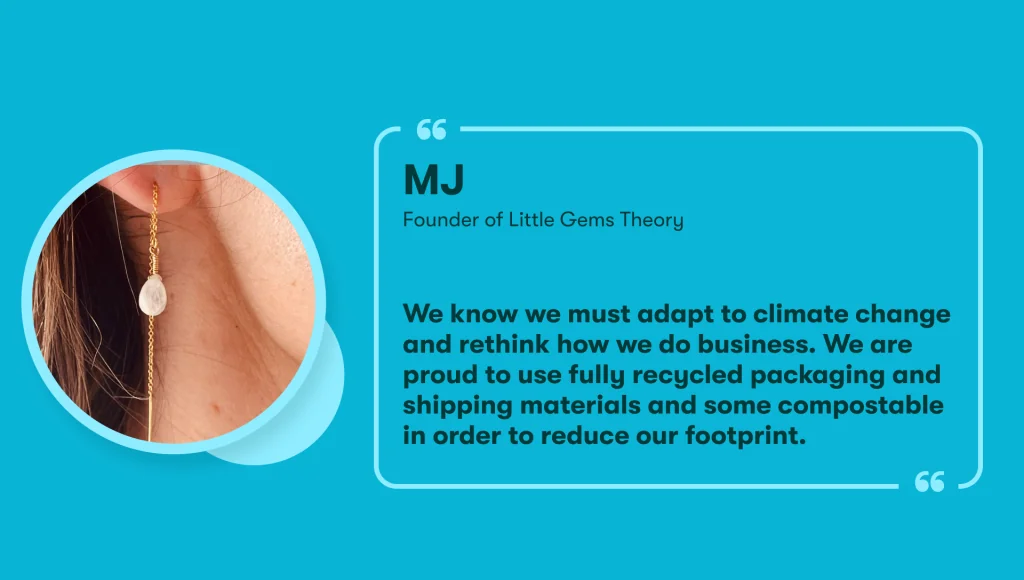
There are multiple ways that you can rethink your packaging. You can always reduce the amount of packaging you use, but you can also incorporate multiple different kinds of eco-friendly materials. MJ, the founder of Little Gems Theory, knows this well.
Their products are delicate pieces of jewelry, but they still need some packaging when they are shipped out. MJ decided that they should use both recyclable and compostable materials. “We know we must adapt to climate change and rethink how we do business. We are proud to use fully recycled packaging and shipping materials and some compostable to reduce our footprint.”
5. Reduce your return rate
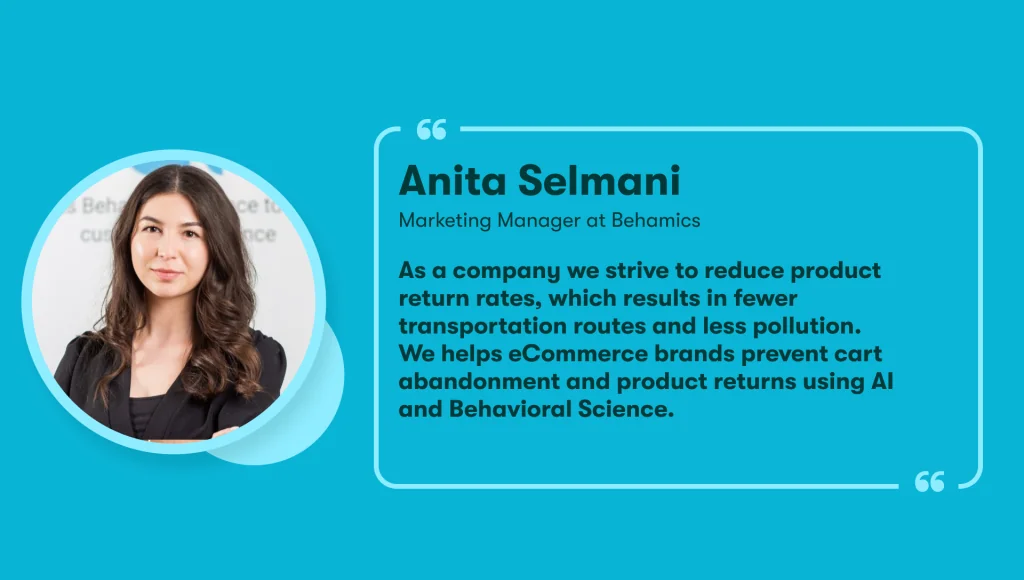
The issue with shipping goes both ways. Sending a product to a customer takes a lot of fuel and other natural resources in addition to time and money, and the same is true when a customer sends a product back.
Anita Selmani, the marketing manager at Behamics, has made it her goal to reduce how often customers send products back. She said, “As a company we strive to reduce product return rates, which results in fewer transportation routes and less pollution. We help eCommerce brands prevent cart abandonment and product returns using AI and Behavioral Science.”
By reducing both returns and cart abandonment, Behamics’ clients reduce their carbon footprint significantly. They also are able to make more money, something which is always a win.
6. Use organic composting methods
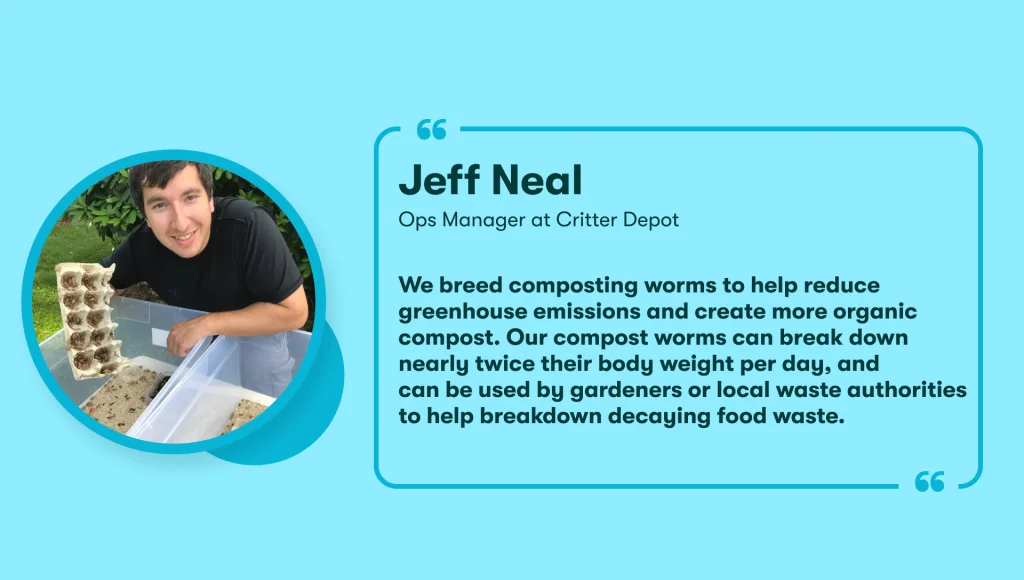
Critter Depot isn’t your typical eCommerce business. The ops manager of the company, Jeff Neal, said, “We are an insect farm, and we breed composting worms to help reduce greenhouse emissions and create more organic compost.”
According to Jeff, Critter Depot provides a solution that eCommerce businesses can use to compost much more effectively than ever before. “Our compost worms can break down nearly twice their body weight per day, and can be used by gardeners or local waste authorities to help break down decaying food waste. When food breaks down naturally, it emits methane, which is a greenhouse gas. But composting worms will break down the food waste, which prevents this greenhouse gas, making them a great service insect for our environment.”
Critter Depot’s insects are very useful, but their general approach to finding innovatively sustainable eCommerce practices is something that all sellers can get inspired by.
7. Design products to be low impact

Although there are many processes that go into eCommerce, the biggest focus is obviously on the product. Natalia Kubler of the jewelry store Pearls and Pomegranates noted that it’s important to make sure that your actual products are as low impact as possible in addition to rethinking your shipping, packaging, and other logistics.
“Our ethical and environmental consciousness drives our vision of sustainable jewelry created with the smallest possible impact,” she said, “which we believe is now a non-negotiable in the luxury e-commerce industry.”
Beyond designing sustainable jewelry, Pearls and Pomegranates has also partnered with a non-profit called Bioconservancy to conserve the Colombian rainforest with every sale they make.
8. Rethink the ordinary
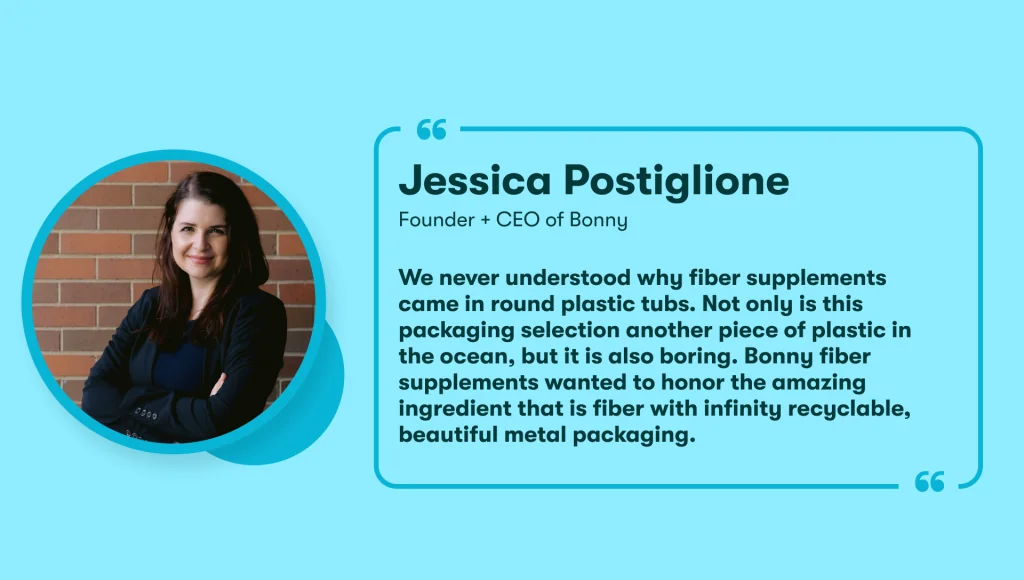
It’s easy to get complacent in the business world. You have so many different tasks to juggle that it becomes easy to overlook areas where you could innovate. If you really want your business to stand out, though, you need to rethink whatever is ordinary and expected in your niche.
Bonny is a great example of this. The brand took a completely different route with the packaging for their fiber supplements, and it has helped them find unique footing while also reducing their environmental impact.
“We never understood why fiber supplements came in round plastic tubs,” said Jessica Postiglione, the founder and CEO of Bonny. “Not only is this packaging selection another piece of plastic in the ocean, but it is also boring. Bonny fiber supplements wanted to honor the amazing ingredient that is fiber with infinity recyclable, beautiful metal packaging.”
9. Make your products reusable
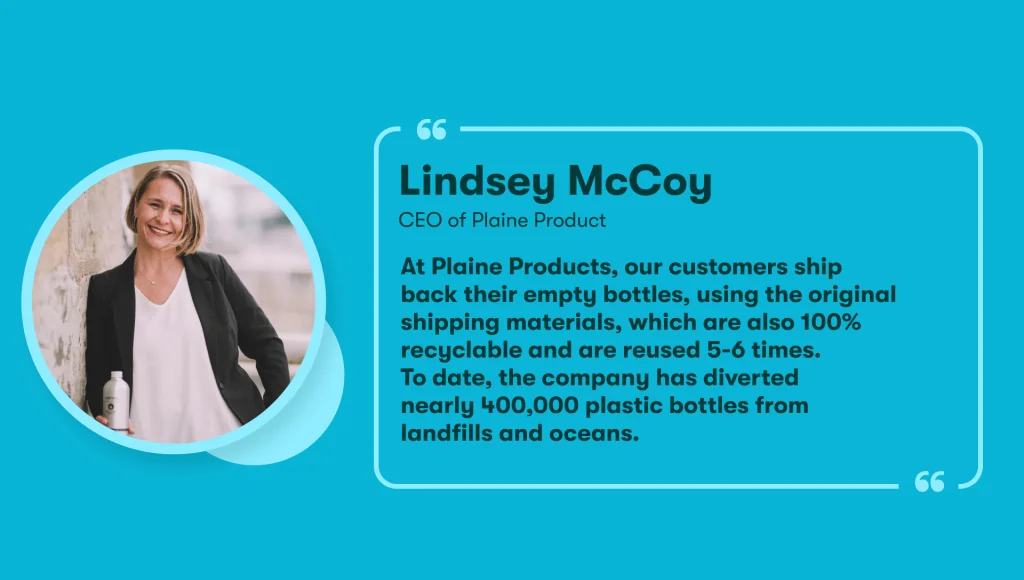
Single-use products might mean more business for you in the short term, but they certainly cause more harm to the environment than products that can be used multiple times in a row. This is especially true in the cosmetics industry, where packaging is constantly being thrown away.
Plaine Products had this in mind when they developed a solution centered around reusability. “At Plaine Products, our customers ship back their empty bottles, using the original shipping materials, which are also 100% recyclable and are reused 5-6 times,” they said. “To date, the company has diverted nearly 400,000 plastic bottles from landfills and oceans.”
10. Find like-minded partners to help achieve your sustainability goals
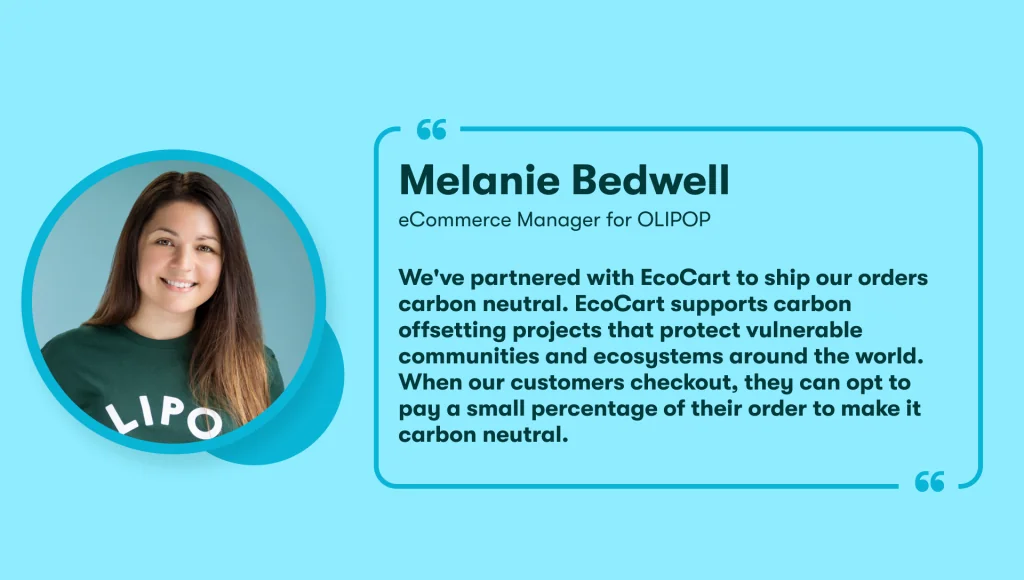
One easy way to make your business more sustainable is to partner with a service like EcoCart. It’s an easy addition to any business model, and it gives customers the ability to offset the impact of their purchases.
Popular content
- 14 strategies to improve your eCommerce business’s financial health
- 50+ ChatGPT prompts to elevate your eCommerce business
- A guide to pricing your product on Amazon
- 5 marketing metrics all eCommerce businesses should track
- All about Amazon PPC
OLIPOP is a soda company focused on creating healthy and tasty drinks, and they love what they have accomplished with EcoCart. Speaking about this, their eCommerce manager Melanie Bedwell said, “We’ve partnered with EcoCart to ship our orders carbon neutral. EcoCart supports carbon offsetting projects that protect vulnerable communities and ecosystems around the world. When our customer’s checkout, they can opt to pay a small percentage of their order to make it carbon neutral.”
11. Get your products straight from the source
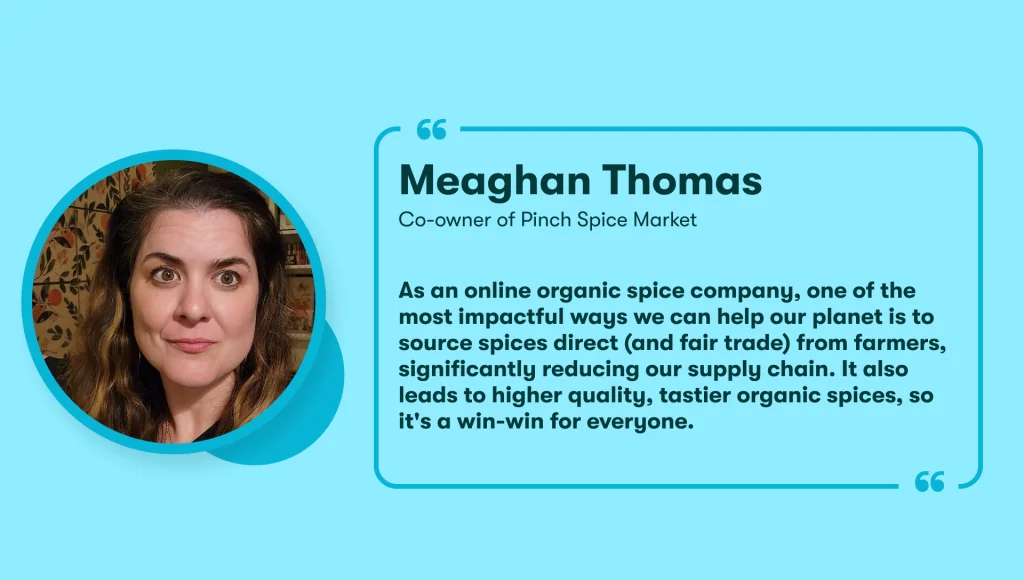
The supply chain for many eCommerce companies is complicated and convoluted. This isn’t good for business, and it’s even worse for the environment. Meaghan Thomas, the co-owner of PinchSpiceMarket.com, spoke about her company’s way of simplifying their supply chain and how it also lessened their environmental impact.
“As an online organic spice company, one of the most impactful ways we can help our planet is to source spices direct (and fair trade) from farmers, significantly reducing our supply chain,” she said. “It also leads to higher quality, tastier organic spices, so it’s a win-win for everyone.” Solutions that are helpful for everyone involved are always the goal!
12. Emphasize your eco-friendly products
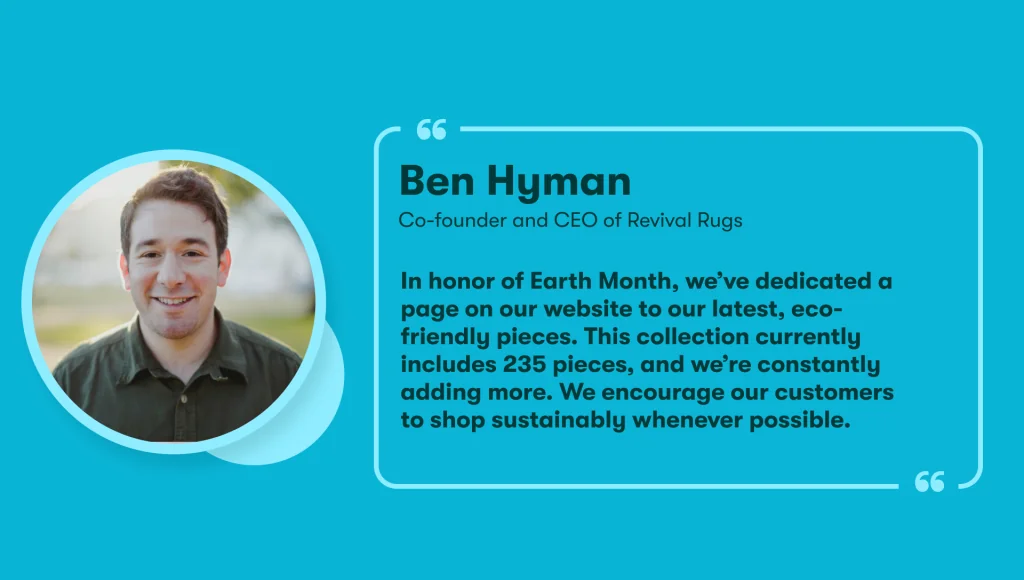
The products that you choose to display to customers can make a large difference in your environmental impact. If you emphasize your most eco-friendly items, you will inevitably sell more of them.
Revival Rugs, a home goods market that serves customers around the world, tried this out. “In honor of Earth Month, we’ve dedicated a page on our website to our latest, eco-friendly pieces,” said their co-founder and CEO Ben Hyman. “This collection currently includes 235 pieces, and we’re constantly adding more. We encourage our customers to shop sustainable whenever possible.”
Revival Rugs shows that you don’t need to reinvent your business to lessen your footprint. You just need to be creative with what you already have.
13. Design timeless items that don’t need to be replaced
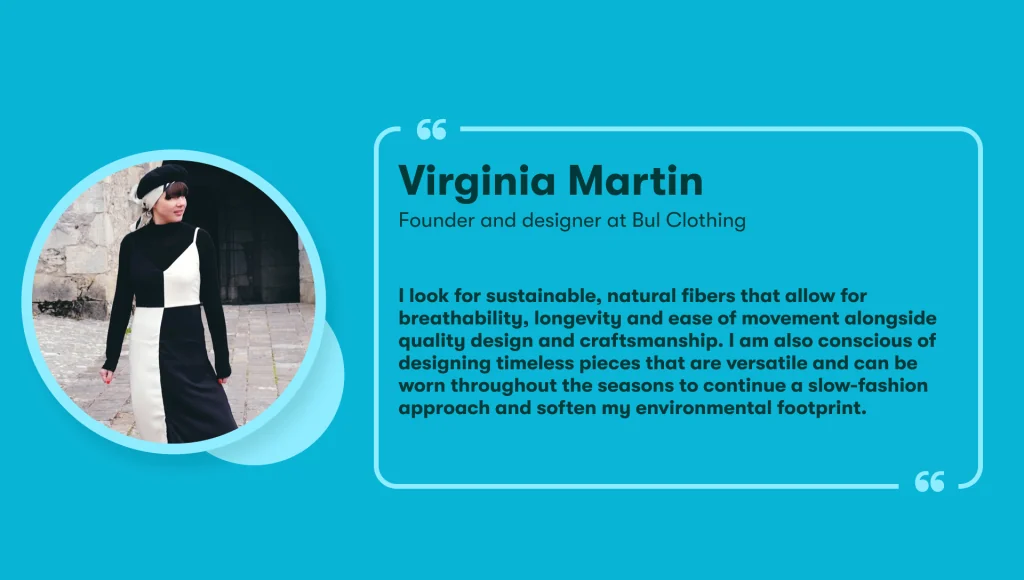
It seems like most businesses are built on a model of making things as affordable as possible even if quality needs to be sacrificed. However, there are plenty of consumers out there that prefer to buy something that they can own or wear for a long time.
Opting for items that are designed to be timeless and reused can make a huge difference. Virginia Martin, the founder of Bul Clothing, spoke about her approach, saying, “I look for sustainable, natural fibers that allow for breathability, longevity, and ease of movement alongside quality design and craftsmanship. I am also conscious of designing timeless pieces that are versatile and can be worn throughout the seasons to continue a slow-fashion approach and soften my environmental footprint.”
14. Give back to your community
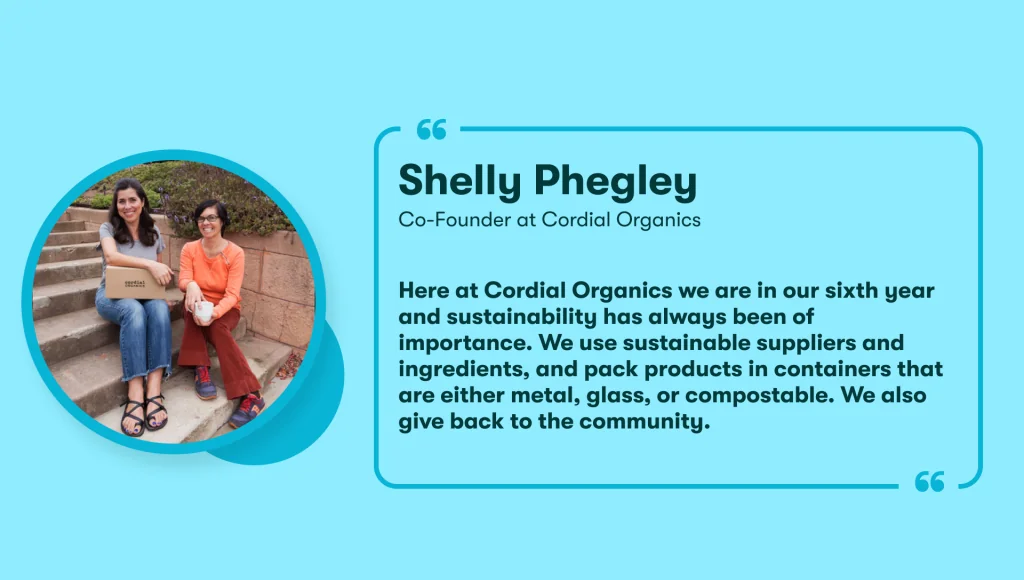
Sometimes it doesn’t feel like enough to just minimize the impact of your products. Cordial Organics, a company that makes beauty and wellness products, takes things a step further.
“Here at Cordial Organics we are in our sixth year and sustainability has always been of importance. We use sustainable suppliers and ingredients, and pack products in containers that are either metal, glass, or compostable,” said Shelly Phegley, the company’s co-founder. “We also give back to the community.”
That last part is key. Uplifting your own business is one part of the puzzle, but uplifting others will have a chain reaction in making the world a brighter, better place.
15. Create a sustainable loop
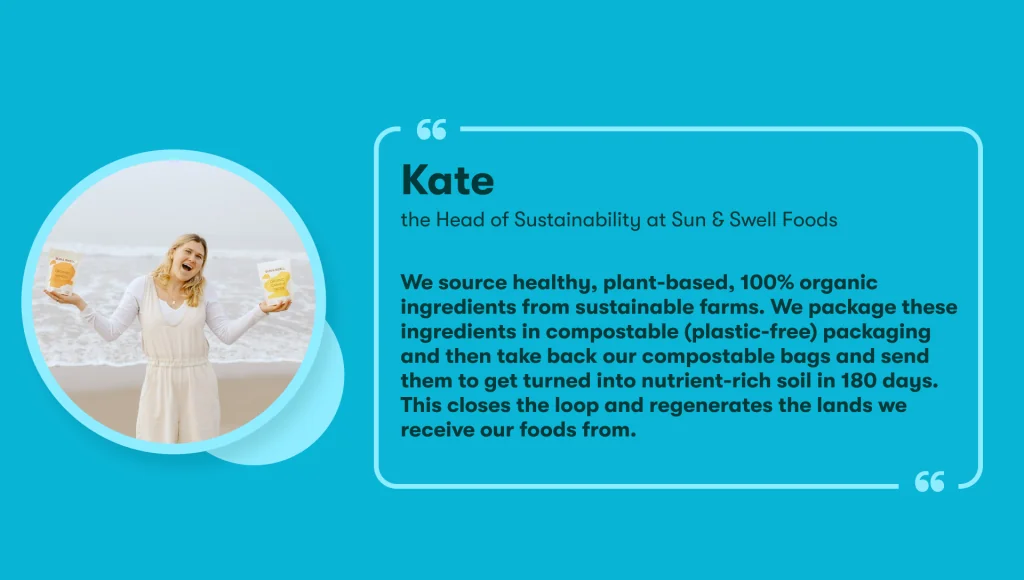
Sun and Swell Foods is an excellent example of a company that has made its entire supply chain as sustainable as possible. Their business model is based around having zero waste, and that starts with where they source their ingredients from. “We source healthy, plant-based, 100% organic ingredients from sustainable farms,” said Kate, their head of sustainability.
But they don’t stop there. They take steps to ensure that they create a sustainable loop that ends where it began. Kate went on, saying, “We package these ingredients in compostable (plastic-free) packaging and then take back our compostable bags and send them to get turned into nutrient-rich soil in 180 days. This closes the loop and regenerates the lands we receive our foods from.”
16. Eliminate unnecessary packaging
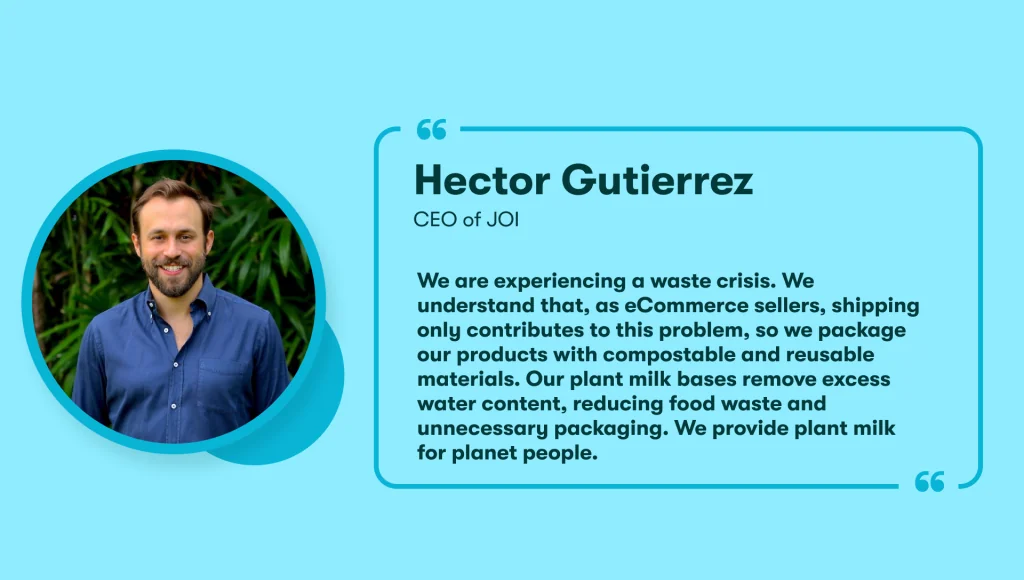
Cutting down on packaging sounds like a simple task, but it can actually be quite challenging to do so. JOI, a company that makes plant-based milk alternatives, minimized its packaging by simply making a product that required less of it.
“We are experiencing a waste crisis,” acknowledged Hector Gutierrez, the CEO of JOI. “We understand that, as eCommerce sellers, shipping only contributes to this problem, so we package our products with compostable and reusable materials. Our plant milk bases remove excess water content, reducing food waste and unnecessary packaging. We provide plant milk for planet people.”
Figuring out ways to reduce unnecessary packaging is difficult, but you can start the process by looking at your product itself.
18. Reuse leftover supplies
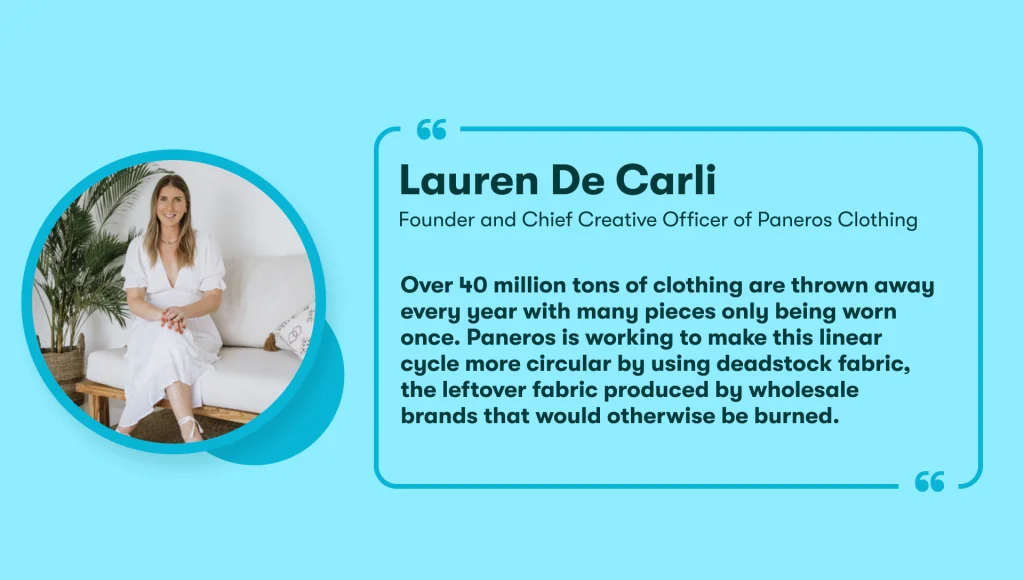
Paneros is a company that is the antithesis of modern fashion in many ways. Despite their trendy designs, they opt to make clothing that can be continually worn and recycled rather than worn once and then thrown out.
“Over 40 million tons of clothing are thrown away every year with many pieces only being worn once,” said Lauren de Carli, the founder and CCO of the brand. “Paneros is working to make this linear cycle more circular by using deadstock fabric, the leftover fabric produced by wholesale brands that would otherwise be burned.”
Using leftover fabric is a brilliant idea that can be implemented by companies outside of the fashion industry. You can always find creative ways to ethically source materials.
19. Only create what is being ordered
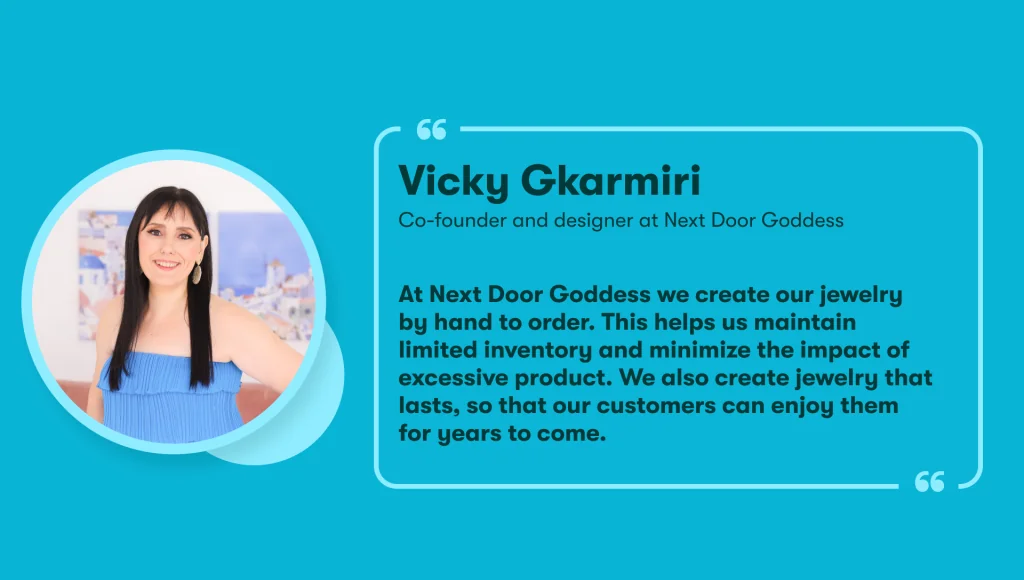
Every shop owner has experienced the issue of having too much inventory. Not only is it a financial burden and a logistical pain, but it’s also bad for the environment. If that inventory ends up being thrown out, that’s a big strain on our planet. Next Door Goddess, a bespoke jewelry brand, combats this by only making the pieces that they need.
“At Next Door Goddess we create our jewelry by hand to order. This helps us maintain limited inventory and minimize the impact of excessive product,” said Vicky Gkarmiri, the company’s co-founder. “We also create jewelry that lasts, so that our customers can enjoy them for years to come,” she added.
20. Plant a tree for every purchase
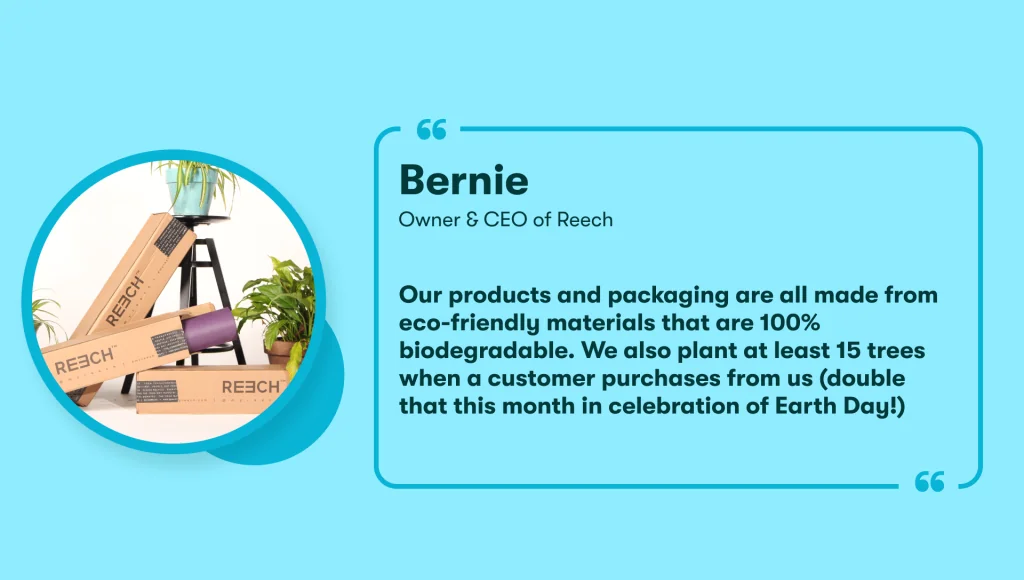
Planting a tree is a lot of fun, but it also does wonders to offset any carbon emissions your company might be making. Bernie, the owner of a yoga mat company called Reech, does this in addition to a few other sustainable eCommerce practices.
“Our products and packaging are all made from eco-friendly materials that are 100% biodegradable. We also plant at least 15 trees when a customer purchases from us (double that this month in celebration of Earth Day!)” he said. This approach aligns with the company’s messaging, showing that they’re really serious about their ethics.
21. Use carbon neutral shipping methods
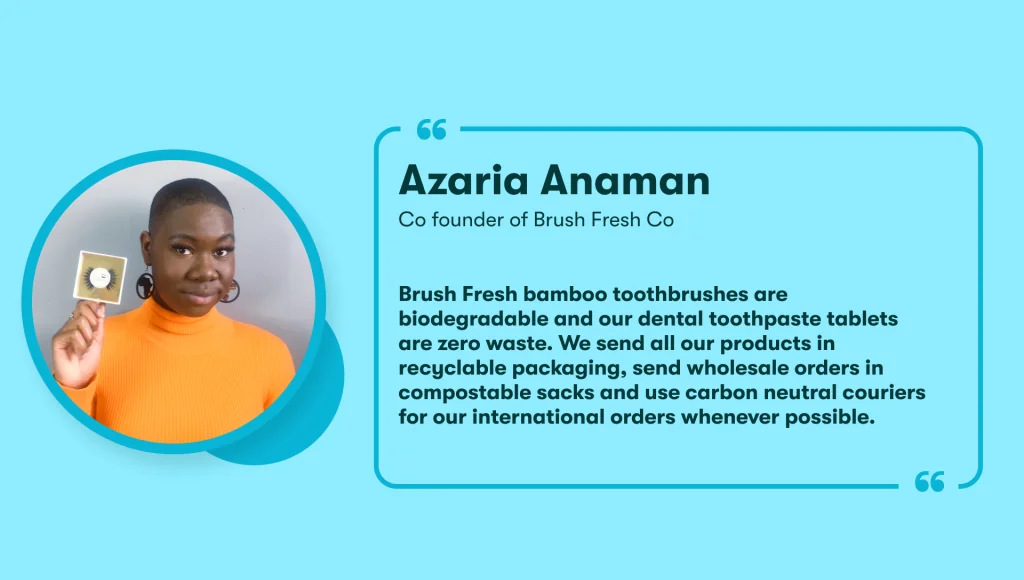
Shipping is certainly where the majority of emissions come from for most eCommerce businesses. Luckily, there are shipping methods you can use that are actually carbon neutral.
The founder of Brush Fresh Co., a company that makes toothbrushes with a sustainable business model, spoke about its approach. “Brush Fresh bamboo toothbrushes are biodegradable and our dental toothpaste tablets are zero waste. We send all our products in recyclable packaging, send wholesale orders in compostable sacks and use carbon neutral couriers for our international orders whenever possible.”
Their dedication to eco-friendly packaging is commendable, but using carbon-neutral couriers is even more powerful. If you handle lots of international orders, it could be worth looking into.
22. Bring awareness to ecological issues
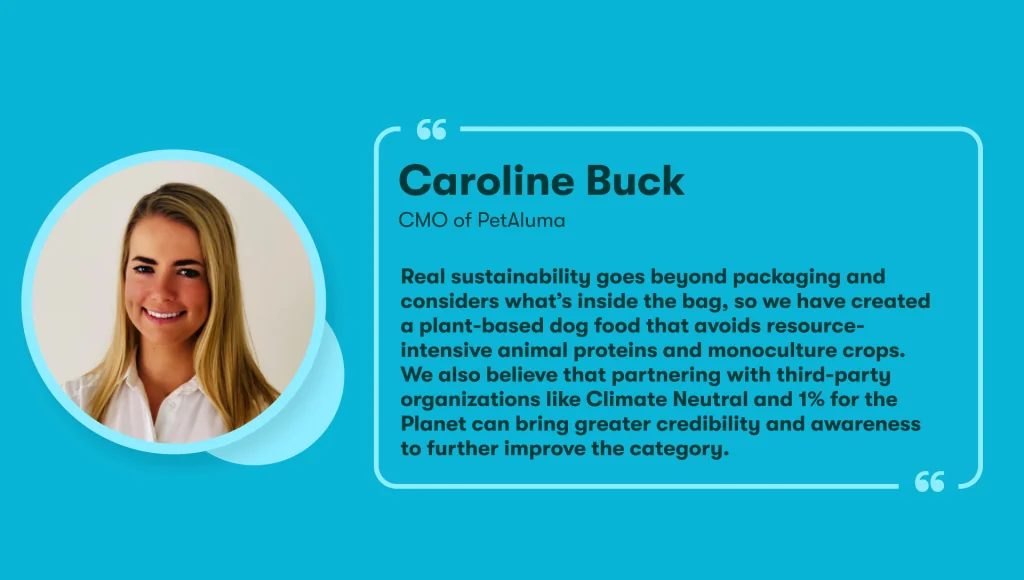
Improving your company’s footprint is one thing, but bringing awareness to the issue may allow your brand to have an even bigger impact. “Real sustainability goes beyond packaging and considers what’s inside the bag,” noted Caroline Buck, the CMO of PetAluma, a dog food brand.
Following up on this, she went on to describe how they bring awareness to climate issues. “We have created a plant-based dog food that avoids resource-intensive animal proteins and monoculture crops. We also believe that partnering with third-party organizations like Climate Neutral and 1% for the Planet can bring greater credibility and awareness to further improve the category.”
23. Look at the details of your materials
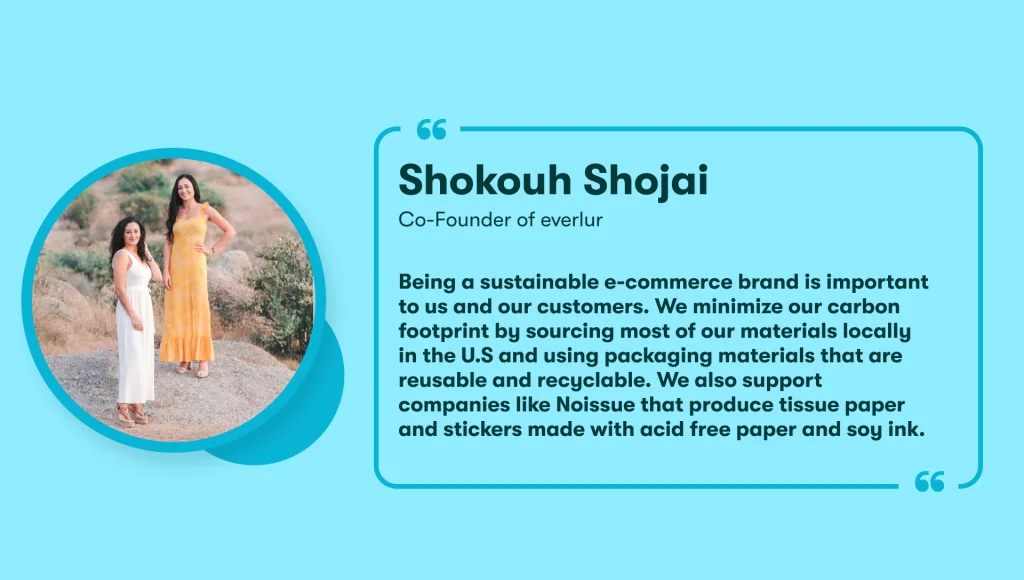
Everlur is a company that makes jewelry designed to manifest good things in your life. Their products are important to them, but their dedication to sustainability is equally as critical in their business model. “Being a sustainable e-commerce brand is important to us and our customers,” noted their co-founder Shokouh Shojai.
They address sustainability in a variety of ways. “We minimize our carbon footprint by sourcing most of our materials locally in the U.S and using packaging materials that are reusable and recyclable,” he said. But they also pay close attention to the details of their materials and what chemicals are used. “We also support companies like Noissue that produce tissue paper and stickers made with acid-free paper and soy ink.”
24. Resell old products
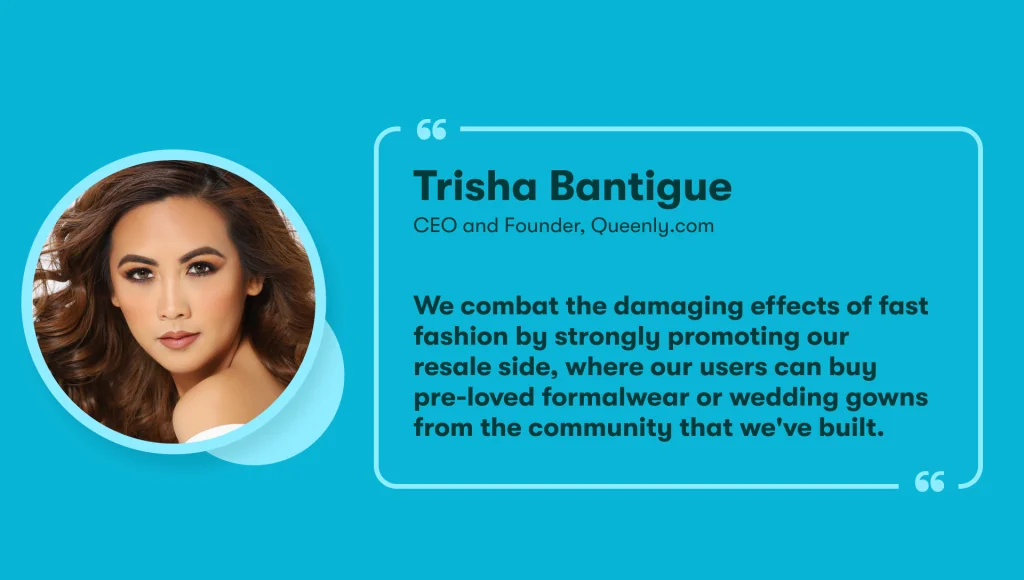
There are lots of large brands out there that have worked reselling their older products into their business model. Patagonia is one great example of this. Queenly, a dress brand, proves that this isn’t just a strategy that works well for big companies.
“We combat the damaging effects of fast fashion by strongly promoting our resale side, where our users can buy pre-loved formalwear or wedding gowns from the community that we’ve built,” said Trisha Bantigue, Queenly’s CEO and founder. Their website makes it easy for users to find and purchase used dresses, and users can happily return garments rather than throw them out. That’s a win-win!
25. Create a long-term delivery schedule
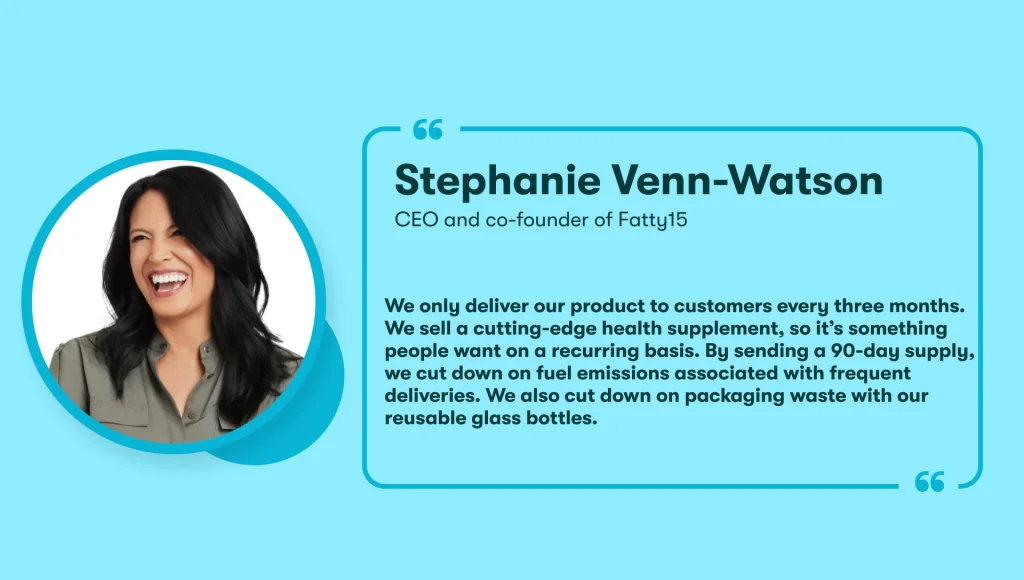
With emissions in mind, Fatty15 is a company that has created a unique shipping schedule. “We only deliver our product to customers every three months,” said their CEO Stephanie Venn-Watson. “We sell a cutting-edge health supplement, so it’s something people want on a recurring basis. By sending a 90-day supply, we cut down on fuel emissions associated with frequent deliveries.”
Fatty15 doesn’t stop there, though. “We also cut down on packaging waste with our reusable glass bottles,” Stephanie added. Having a multifaceted approach to sustainable eCommerce is certainly a good thing.
Each of the eCommerce sellers above shared their own unique approach to sustainability, and we learned just how many different ways you can cut down your emissions and fight for the environment. From packaging to the supply chain to product design, there’s always a way to put Planet Earth first.
If you’re looking to innovate your approach to sustainability, we’re here to help. Our funding platform can help you make any changes to your business plan and supply chain. You’ll be able to build up your business so that you can engage in the sustainable eCommerce practices we’ve talked about with these successful sellers.
Start by building your free 8fig Growth Plan today.
Subscribe to the eCommerce newsletter for
top industry insights
to our blog
Read the latest
from 8fig

AI is quietly reshaping eCommerce. Karma’s Hadas Bar-Ad explores how today’s sellers are using intelligent tools to streamline operations, boost efficiency, and drive smarter growth.

WhatsApp isn’t just for memes and group chats anymore. With a 98% open rate, it’s the secret weapon your eCommerce marketing strategy might be missing. Here’s how to do it right.
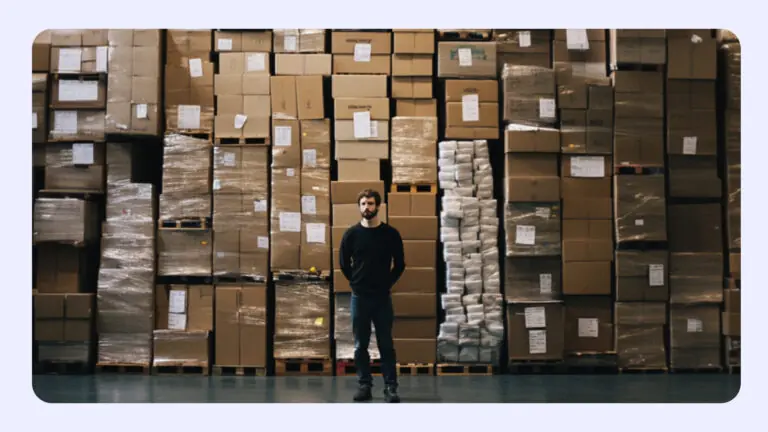
Stuck with extra inventory after Amazon’s Spring Sale? Learn five smart strategies to clear unsold stock, boost cash flow, and avoid future overstocks with smarter inventory planning.
